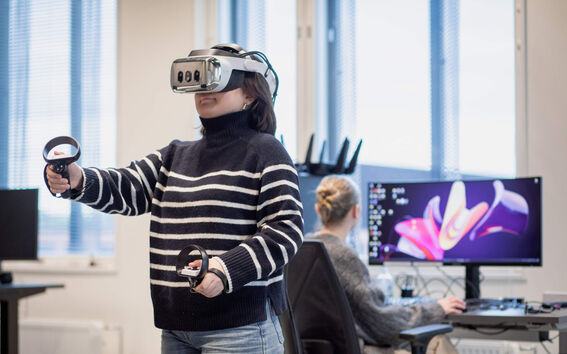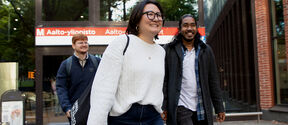Studiernas uppbyggnad
Huvudämnet Human-Computer Interaction hör till det tvååriga magisterprogrammet Master's Programme in Computer, Communication and Information Sciences. Sammanlagt består programmet av 120 studiepoäng.
- Huvudämnesstudier (40 eller 60 studiepoäng)
- Eventuella biämnesstudier (20–25 studiepoäng)
- Fritt valbara studier (25–30 studiepoäng)
- Diplomarbete (30 studiepoäng)
De studerande kan välja ett biämne antingen bland de andra ansökningsalternativen inom programmet Master's Programme in Computer, Communications and Information Sciences eller från andra program som erbjuds vid Aalto-universitetet. Målet är att alla huvud-och biämnesstudier genomförs under det första studieåret då du lär dig de centrala metoderna och teknikerna inom design och analys av interaktion.
Ditt andra år är vigt åt diplomarbetet och fritt valbara studier som ger dig möjligheten att inrikta dig på ett tekniskt tema. De fritt valbara studierna kan bestå av ytterligare kurser inom huvudämnet, ett andra biämne, mångvetenskapliga kurser eller studier utomlands Du kan välja i princip vilken kombination av kurser som helst – från Aalto eller andra universitet i Finland och utomlands – som stöder dina studier och motsvarar dina intressen. Du kan till exempel delta i kursen Interaction Design vid Högskolan för konst, design och arkitektur.
Vid sidan av interaktiva föreläsningar och seminarier betonar undervisningen i programmet praktiskt lärande, forskning och grupparbeten. All undervisning leder fram till ett större projekt som kommer att testa din förmåga att designa, bygga och studera ett system från början till slut.
Mer information om studierna och undervisningsplanen finns i Studentguiden. Vissa förändringar kan ske i kursutbudet för läsåren 2026–2028 — de nya undervisningsplanerna publiceras i april 2026 och blir samtidigt tillgängliga i Studentguiden.
Våra läroplaner är planerade för heltidsstudenter. Även om magisterstuderanden ofta arbetar deltid under läsåret eller heltid på sommaren, rekommenderas heltidsarbete inte under läsåret. Deltidsarbete kräver noggrann planering och extra ansträngning, eftersom de flesta kurser inte är tillgängliga online eller erbjuds varje år.
Även om det kan finnas kurser som är tillgängliga online, är den allmänna riktlinjen att studierna vid Aalto-universitetets högskola för vetenskap kräver närvaro på campus.












